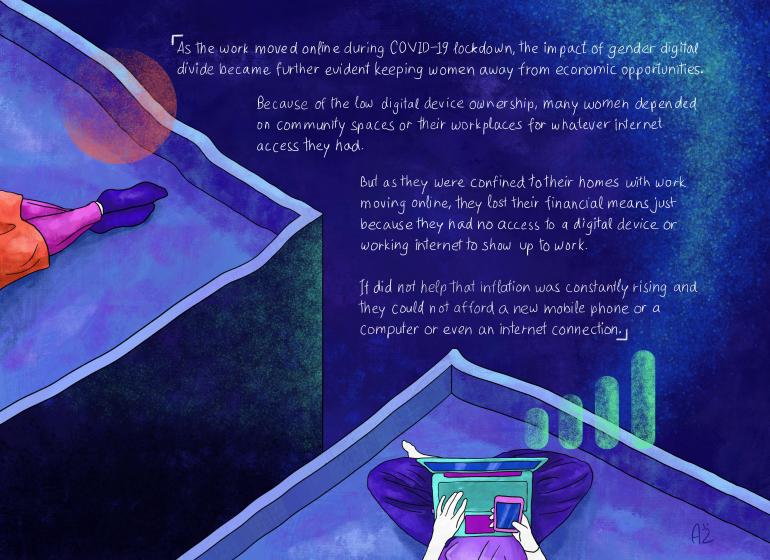
Patriarchal restrictions on internet access lead to impacts that affect all aspects women's lives in Pakistan. Illustrations by Aniqa Haider.

Pakistan is among the countries with the highest gender digital divide, which means that women and young girls are denied digital access here more than most of the countries in the world.
Most of the girls depend on families to allow them to own a mobile phone or access the internet, but refusal to connect to a digital device leads to the widening of the digital divide.
As a result, they are left behind in a lot of industries and opportunities.

The COVID-19 lockdowns revealed that the gender digital divide induced by patriarchal control within homes barred girls from accessing their online classes.
Where boys were given priority to consume internet bandwidth for their online games, girls were told to make chai for their family instead of attending their online class.
“During the lockdown, I only attended one online class the entire semester because I’d be told to go offline because someone else wanted to make a WhatsApp call or play a YouTube video,” - Hira
The burden of domestic responsibilities on girls and women within households continues to keep them away from online learning opportunities.

As the work moved online during COVID-19 lockdown, the impact of gender digital divide became further evident keeping women away from economic opportunities
Because of the low digital device ownership, many women depended on community spaces or their workplaces for whatever internet access they had
But as they were confined to their homes with work moving online, they lost their financial means just because they had no access to a digital device or working internet to show up to work
It did not help that inflation was constantly rising and they could not afford a new mobile phone or a computer or even an internet connection.

In a country like Pakistan where women’s healthcare is already not a priority, stopping women from joining the internet bars them from accessing plethora of life-saving information available from around the world.

With women living under patriarchal control on their digital access, their freedom of expression, right to privacy and even their right to political affiliation, it is made challenging for them to engage in political discourse.
It does not help that when they do manage to get online through some means, online violence as a result of them having a voice in public spaces makes matters worse by putting their safety at risk.
And where governments and political parties should be promoting participation, their members and supporters become the reason why the violence is ensued leading to a widening gender digital divide.

This is just the tip of the iceberg, and there are many ways the gender digital divide impacts women and girls on a deeper level.
And this impact is much deeper when they are institutionally denied opportunities because of the heavily patriarchal society that Pakistan is.
The need is to encourage digital access for women and girls on school and household level by offering enabling environment through policy and packages.
- 1044 views






Add new comment